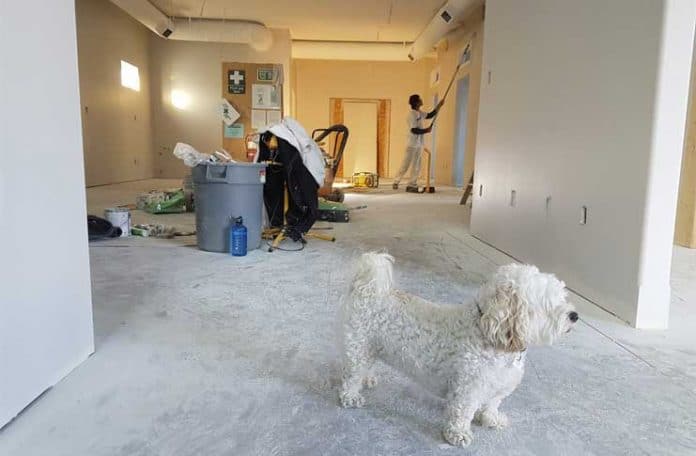
For most people, painting a house is a burden, while for some – it’s fun. It’s what they love to do. They love working with their hands, mixing the paints, rolling the brushes and watching their creation at the end. If that sounds like you, and even if not and you’re just looking to start your own business – then you should definitely read our short guide on how to start your small painting business.
Is a Painting Business a Good Idea?
Well, it might be, but there’s no business that’s 100% bulletproof. One thing is sure, a Painting business can be a great way for you to make money, since it’s quite easy to learn and become a pro, it’s quite scalable, and with good marketing skills and people skills – you can easily outperform your competition. However, making it in the painting business means work really hard, so be ready.
1. Learn the Trade and get Professional Training
Having done a few personal house paints doesn’t make you a professional painter. If you decide to start a business, it needs to be professional. You will need to get some professional training. There are many countries in the world where without proper education or certificate training in Painting – you cannot start a painting business. That’s why you see highly professional companies in countries like Germany, Austria, Denmark and others. For example, (especially for our readers and OFWs in Copenhagen) you can check out this professional Painting service company in Denmark, called maler. You can later learn from Maler how to structure your own services and offers, how to design your website, and much more.
Remember, even if you’ve worked for a big painting company for a few years and feel ready to start your own painting business, don’t skip getting a nice certificate that you can hang at your future office. For a good training in painting, you can check some TESDA accredited courses.
In addition to professional training, try to learn as much as possible from pros online. You can check The Idaho Painter on YouTube. He’s not just a pro painter, he’s a great YouTuber who knows how to make awesome educational videos.
2. Structure Your Services and Decide who Your Clients will be
There are A LOT of services that you can offer as a Painting Business, but you don’t want to offer all – and probably won’t be able to. It’s better to specialize and become a pro only in a select number of painting services that you are good at and want to do, and offer only those to your clients. Don’t worry, you don’t need to offer all the painting services in the world in order to become a successful painting business. Remember, if a client does ask for a service that you don’t offer, you can easily refer him to a colleague or a partner-business that does. You can also subcontract these jobs to other painting experts.
How to select the painting services I should offer in my business?
Well, this will naturally depend on your clientele, and in other words – who your clients are, or who your target market is. Will it be Residential or Commercial clients? These are two totally different types of clients and jobs that will influence the type of business you build. It’s different types of people, different services, different sizes of projects, and more.
Residential clients are great, because they pay early on and the cash flow is healthy. However, you’ll need to work harder on marketing and getting new clients, since it’s not easy to get recurring jobs from residential clients. These clients might need a painting job only every 3-4 years, or more. It’s not a regular recurring job, so you’ll need to ask your existing clients for referrals, and pump up your marketing efforts.
Commercial clients on the other hand, are great for getting recurring jobs and usually offer much bigger projects. The problem with them is cash flow. You won’t receive your money so fast, sometimes after 30 days, and sometimes after 60 or even 90 days.
Research each market and according to your vision and capabilities – decide which clients you want to focus on. This decision will naturally influence the way you brand your business in the long run, build your business model and more.
3. Set up Your Business
This step includes the ugly part of incorporation, dealing with government departments and bureaucracy, but also the exciting part of choosing a name for your business, and finding the perfect location.
As for your business name, ensure its professional, presentable, and catchy – so people can easily remember you when they need their next painting job. Try to imagine it in a Logo, on your uniform or on invoices. Also, check if the domain for the name is available. You’ll want to set up a website for your business, and the exact name as the domain is always better for marketing.
4. Price Your Services
This is probably one of the most important and challenging parts of starting your painting business. If you overprice your services – you might not get enough clients, and if you underprice – you might end up in the red.
Basically, in painting jobs, clients are charged according to the size of the project, its difficulty, the type of equipment and the expertise required. For example, the exterior painting of a 3-story house requires more expertise and equipment than an indoor 3-room apartment painting job.
Consult with a painting expert and check the pricing of your competitors, as you determine the costs and pricing of your painting services. Remember to include the cost of materials, transportation, labor costs, and other ongoing expenses related to the project.
Tips to be More Profitable
If you have some cash to invest early on, we suggest purchasing some painting tools that could boost your revenues and efficiency. An airless paint sprayer, for example, can boost your profits by the fact it can increase the number of jobs you can finish in a week.
5. Purchase your Tools and Materials
Luckily for you, a painting business does not require a lot of tools or materials. However, you should have a small truck to pack your rollers, brushes, trays, drop sheets, and of course – a ladder or two. We recommend getting started just with the basic tools. Only when you get a serious painting job – you can upgrade your tools and get an airless paint sprayer.
Do you need a lot of money to start your painting business?
Aside from the truck (hopefully you already have one!) – you won’t need a lot of money to start your painting business.
However, if you don’t have clients right from the start – then you’ll need to invest a bit in marketing.
6. Start Your Marketing Campaign
Don’t worry, we didn’t mean a real marketing “campaign”. All you’ll need is a nicely designed website, forming an online presence, as well as a social media presence, and simple business cards.
First thing, buy a domain from GoDaddy or other domain registrars. As mentioned, try to get a domain with your business name.
For the website itself, if you don’t have the budget for a good web-designer – we suggest this: Research online and find the top-performing painting businesses that pop up on your search results. Look for those with nice and simple design and structure. Pick the 1 or 2 websites that you like most, and then go to Upwork.com or Fiverr.com. These are online Freelancer platforms where you can find a digital workforce that can build your site with WordPress (a popular website CMS) for a fraction of what top web-designers charge. Ask them to use a paid Theme (usually costs anywhere between $30 to $60), so the total job cost would be around $100 to $150.
In addition to a website, you’ll need to build your online presence by signing up on platforms like Gawin.ph, Carousell, and of course – Google My Business. On top of that, create a Facebook page for your business, and maybe Instagram (if you like taking lots of pictures of your work). All these online platforms will help your business get seen more, although it will take time, patience and hard work.
Finally, always have business cards with you. These are essential for networking, and make it easy for potential clients to make contact when they do have a job for you.
Good luck!




